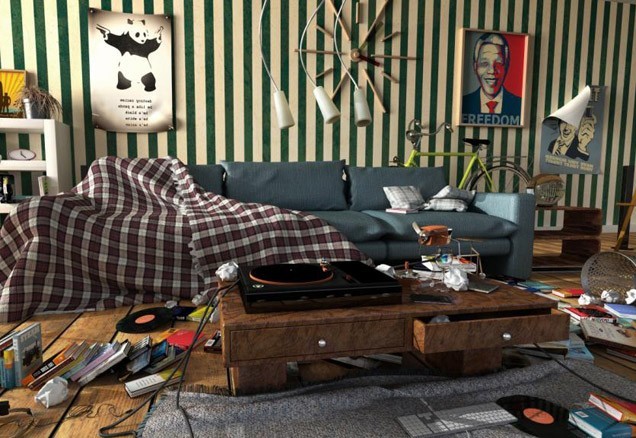What Lies Within a Messy Room
It happens slowly – a towel tossed over a chair, a tissue left on a desk. Many take control over the situation before their bedroom, home, or workspace turns into something out of an episode of TLC’s Hoarders. But for some, there is no straw (or empty soda can, or crumpled paper, or dirty sock) to break the camel’s back. Cleanliness is simply not a virtue they possess. But if we try to read a messy room like a fortuneteller’s tea leaves, what does it say?
The Original Slobs
Think back to the messiest version of yourself and chances are you’ll return to the time of high school dances and driving lessons. The words “clean your room” have become a phrase that stands as a kind of parental mantra. For every mess there’s a cause, and for teenagers, common ones include using their personal space as a rebellion against their parents, being too busy with school and extracurriculars, and downright now knowing how to maintain a clean room. But when the messiness persists after adolescence has subsided, there could be a different reason buried among the candy wrappers and old shoes.
When a Messy Room is a Cause for Concern
Nobody can keep their home looking like a spread from Better Homes & Gardens 365 days a year. It’s natural for your space to look less than picture perfect when involved in a stressful situation, such as a move, an illness, or a busy period at work. Ariane Benefit, living coach, says these types of messiness are characterized as situational disorganization, meaning they stem from a certain temporary cause.
When someone’s temporary clutter turns into long-term chaos, it can often signify that person hasn’t recovered from a stressful event, such as a death or divorce, which could be reasonable cause for situational disorganization. Those who are in a permanent state of grieving may isolate themselves so fully that they don’t even notice the mess anymore.
World Famous Messes
But Benefit also tells us that certain positive characteristics can lead to disorganization, such as high intelligence and an intense ability to focus.
Albert Einstein famously said, “If a cluttered desk is a sign of a cluttered mind, then what are we to think of an empty desk?” If you study the desks and rooms of some of the most famous creatives in history, from Mr. Einstein to Steve Jobs to Mark Twain, you’ll notice a trend: creative people are often hopelessly unorganized.
One possible reason why the creative and intelligent could also be roommates from hell is because they see uses for objects that others don’t. In fact, a study by Dr. Katherine D. Vohs at the University of Minnesota shows us even neat people may experience the same spark in ideas if they spend time in a messy room.
In her study, Vohs and her team invited forty-eight test subjects to the laboratory and assigned them to messy or tidy rooms before asking them to imagine uses for Ping-Pong balls. While subjects in both rooms came up with about the same number of responses on average, the subjects in the messy room produced uses that ranked much higher in creativity.
It’s much easier to throw out a Ping-Pong ball when all it appears to be is a Ping-Pong ball. But it might be harder if you see it as an object capable of multiple purposes, like serving as an ice cube tray, or preventing chair legs from scratching floors, answers which messy room test subjects produced.
Sometimes, if you dig beneath all that clutter, you’ll find a silver lining. While some may outgrow living in a space that looks like a warzone, for others it could be just a personality quirk. A messy room can be a sign of depression or hopelessness, but it could just as easily be the side effect of a mind that’s better at innovation than organization.










